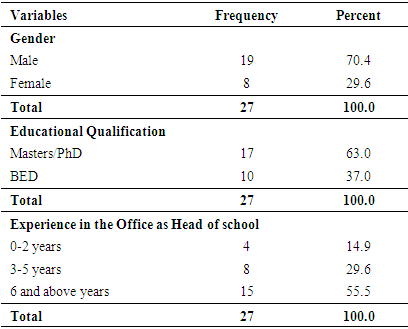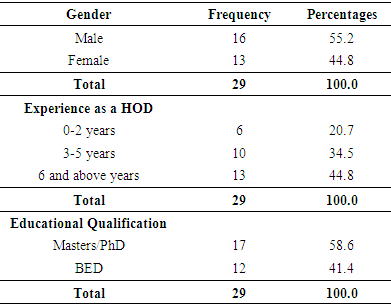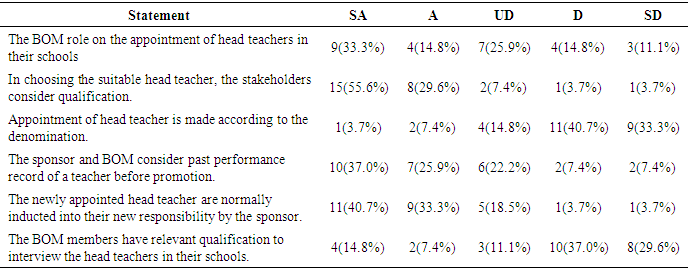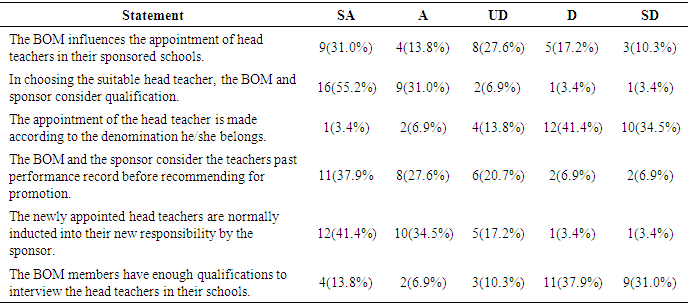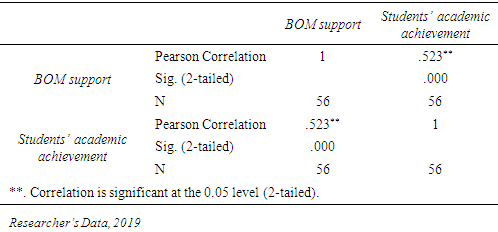-
Paper Information
- Paper Submission
-
Journal Information
- About This Journal
- Editorial Board
- Current Issue
- Archive
- Author Guidelines
- Contact Us
Education
p-ISSN: 2162-9463 e-ISSN: 2162-8467
2020; 10(2): 25-32
doi:10.5923/j.edu.20201002.01

Role of Board of Management towards Academic Achievement in Sub-County Schools in Kenya
Kennedy Ochieng Ojijo1, Jack Odongo Ajowi2, Peter JO Aloka2
1Master’s Student in Educational Administration & Management, School of Education, Jaramogi Oginga Odinga University of Science & Technology, Kenya
2School of Education, Jaramogi Oginga Odinga University of Science & Technology, Kenya
Correspondence to: Peter JO Aloka, School of Education, Jaramogi Oginga Odinga University of Science & Technology, Kenya.
| Email: |  |
Copyright © 2020 The Author(s). Published by Scientific & Academic Publishing.
This work is licensed under the Creative Commons Attribution International License (CC BY).
http://creativecommons.org/licenses/by/4.0/

The study investigated the role of Board of Management in the enhancement of academic performance in Sub-County day secondary schools in Mbita Sub-County of Kenya. This study was guided by the theory of all-round educational quality. The study employed Concurrent Triangulation Design within the mixed methods approach. The population consisted of 32 head teachers, 160 Heads of Departments (HoDs), 32 Board of Management (BoM) chairpersons, and 1 Sub County Quality Assurance and Standards Officers (SCQASOs). Saturated sampling technique was used to select 29 head teachers, 155 HoDS, 29 BoM Chairpersons and 1 SCQASOs. Data was collected using questionnaires and interview schedules. To ensure face validity of the research instruments, experts from the Department of Curriculum and Educational Management were consulted and their input incorporated in the final document. Reliability of the instruments was determined by piloting the instruments in three Sub-County day secondary schools, which constituted 10% of the population. Quantitative data collected by questionnaires was analyzed using descriptive and inferential statistics. Qualitative data from interviews was analyzed thematically. The study established an average positive (r = 0.523) correlation between the BOM support and students’ academic achievement. It is recommended that the Ministry of Education should put more training programmers to principals on collaborative activities.
Keywords: Board of Management, Enhancement, Academic performance, Sub-County, Day secondary schools
Cite this paper: Kennedy Ochieng Ojijo, Jack Odongo Ajowi, Peter JO Aloka, Role of Board of Management towards Academic Achievement in Sub-County Schools in Kenya, Education, Vol. 10 No. 2, 2020, pp. 25-32. doi: 10.5923/j.edu.20201002.01.
Article Outline
1. Introduction
- School‘s board of management is the collective name given to the individuals who oversee the operations of an education institution directly serving the public interest (Basic Education Act 2013), Effective management is an integral competent factor for running successful organizations. The School Board of Management (BOM) is the central policy making organ for each education institution in the United States. In Britain however, the school Board of management is found from 8th grade up to the 12th grade whose sole task is to effectively assist the principal in managing the institution (Van, 2001). Van indicates that the school Board of management chairperson and school managers appointed by the government in United States and United Kingdom are highly qualified and experienced to serve in such tasks. If a school is not effectively managed, parents have authority to petition for removal of the boards of management so that it can give way for a new board (Keith, 2001). In Malawi and South Africa, the school board of management is selected from prominent members of the society who have excelled in their areas and considered as role models in their line of specialization (Dawson, 2008). In Zimbabwe, the government has laid down rules and regulations regarding recruitment and duties of school board of management in primary schools. In Zimbabwe, the minimal level of education for qualification is a secondary school certificate (Aduda, 2001). According to Kamba (2010), states that the involvement of BOMs in management is greatly recognized in both developing and developed countries. The better performance at large in various schools is as a result of the parents effectively being involved in the school activities.In Kenya, the Board of Management (BOM) is the collective name given to individuals who oversee the operations of an education institution (Basic Education Act, 2013). Each country has rules on the appointment of the members though in most cases they are appointed by the government (Van, 2001). The BoM members are selected from prominent members of the society who have excelled in their areas of specialization and are therefore regarded as role models (Aduda, 2001; Dawson, 2008). The administration and management of secondary schools is in the hands of the BoM. The school Principal is secretary and the Chief Executive Officer. The management of secondary schools by the BOM was instituted after independence following recommendations by the Ominde Report on education matters in 1964. The major aim was to decentralize authority for more effectiveness. The Sessional Paper No. 6 of 1988 states that BOM should be appointed from among individuals with qualities of commitment, competence and experience which would enhance the effective management and development of educational institutions (MOEST, 2007).The major role of the BOM in Kenyan schools is to promote quality education, develop institutional policies, provide adequate infrastructure and monitor curriculum development. The BOM is also involved in decision making, financial matters, monitoring education standards and recruitment of teaching and non-teaching staff (MOEST, 2005). According to the Taskforce on student indiscipline and unrest (ROK, 2001), the appointment of BOM members who were unqualified and incompetent impacted negatively on the quality of management of schools. Boards assisted schools with the acquisition of physical resources and promoted discipline; all these led to the achievement of quality education (Kindiki, 2009). In general, the BOM should contribute to educational development in schools. Despite the expectations on the BOM regarding their effectiveness, their performance has been greatly criticized especially in Sub-County day secondary schools where their performance is seen to be below par. The Commission of inquiry into the education system of Kenya (ROK, 1999) found out that the management of educational institutions was ineffective because most BOM members lacked quality management skills.According to the Mbita sub-county Development Plan of 2012–2016, there are low education standards, which have close relationship with understaffing in schools, lack of enough classrooms, dormitories, toilets (Republic of Kenya, 2009). The plan recommends serious need of water supplies and sanitation facilities. The same challenge is also echoed in Mbita Sub-County Development Plan 2008–2012 that reports that there are overstretched facilities for both teachers and students. The Development Plan also explains that it is important for Board of Management to provide infrastructure like buildings and address poor workmanship and misappropriation of funds. In KCSE results of 2010, the first Sub-County day secondary school in Mbita Sub-County took position 433 nationally with no student in top 100. In 2017, the same trend continued with the best mixed day secondary school in Mbita Sub- County taking position 434 without any student in the top 100 (MOE, 2012). When releasing 2013 KCSE results, it was observed that Sub-County day secondary schools in Nyanza where Mbita Sub-County is situated registered dismal performance. In 2014, the situation seemed to have improved with one boy from a Sub-County day secondary school in Mbita Sub-County securing position 42 in Homa-Bay County. The case of Sub-County day secondary schools where students hardly attained average mean grade of C+ was particularly disturbing the Sub-County especially in areas where such schools are situated. The study investigated the role of the board of management towards academic achievements in Sub-County mixed Sub-County Schools.Literature ReviewThis study was based on the theory of all-round educational quality by Zhang in 2010. The implementation of all-round quality management began in western developed countries since the early 90s, and now it is developing quickly. The all-round quality education is the application of all-round quality management in the area of education. Various authorities have viewed leadership from varied but closely interrelated ways. Head teachers of Secondary Schools are in leadership positions. Massie (2000) defines leadership as a process in which a leader influences the activities of the subordinates towards a certain direction. Maranga (2001) supports the need to identify and train teachers on secondary school administration because some head teachers do not take their responsibilities seriously. Siringi (2003) reports that many Board of Management members in Kenyan secondary schools question the suitability of many head teachers to the posts they hold because they seem to be managing schools by crisis. The study report stressed that the unrests reported in many secondary schools of Eastern Province in 2003 exposed poor management skills on the part of the school head teachers. Macharia (2004) argued that head teachers still exhibit leadership styles that are top down and autocratic expecting students and teachers to accept decisions made without them being consulted. The impact of the head teachers’ leadership depends on the support from teachers with whom he works (Mayhard, 2002).In research on collaborative school management by Lagat (2001), the researcher notes that a successful head teacher practices collaborative management by involving Board of Management. The study reported that autocratic leadership styles were traditional in nature and were not applicable in current school system. According to Lagat, leadership practices of a democratic head teacher are seen through participation of teachers in decision making, designing of resources, goal setting, policy making, budgeting, implementing and evaluating school programmes. In such a case, teachers are treated as colleagues in leadership whose support the head teacher requires in order to succeed. Though not admitting that head teachers were autocratic in their leadership style, Apiyo (2003) found that head teachers were perceived to be competent in carrying out administrative tasks by involving teachers with the aim of improving students’ academic achievement. Apiyo (2003) cites Taylor’s theory of management which emphasized that a leader would focus on attainment of goals and objectives of the organization without necessarily taking into consideration the welfare of the staff. However, Apiyo (2003) reported that motivating teachers would make them perform their tasks and help students attain better academic standards. Musungu (2007) carried out a study on the contribution of the head teachers to academic achievement in 84 secondary schools with a teaching population of 1280. Musungu’s study used random sampling techniques to select a sample for high and average performing schools while current study used saturated sampling techniques.Onyango (2001) conducted a study in Nairobi and Kakamega to determine the competencies needed by head teachers for effective and efficient management and leadership of secondary schools. The study found out that in order for all these tasks to be performed effectively, head teachers needed prior training in secondary school administration. Onyango (2001) ignored the contribution of the Board of Management in the effective and efficient quality leadership in secondary schools. Therefore, this study was to establish the contribution of Board of Management to quality leadership and academic achievements. Apiyo (2003) study on administrative competencies in Nandi district equally ignored the contribution of Board of Management, which can assist the head teachers to be competent and enhance good academic performance for students in secondary schools. The present research will find out the contribution of Board of Management to quality education, which is lacking in Onyango and Apiyo’s study.
2. Research Methodology
2.1. Research Design & Participants
- The researcher employed the Concurrent Triangulation Design. In this design, both quantitative and qualitative data were collected at the same time, analyzed at the same time then merged by triangulation of the data (Creswell, 2013). The population of this study comprised 32 head teachers, 32 HoDs, 32 BOM chairpersons and 1 SCQASO. The head teachers, heads of departments and Board of Management chairpersons were obtained using saturated sampling technique, while the Sub County Quality Assurance and Standards Officer was selected using the purposive sampling technique.
2.2. Research Tools
- The data collection instruments included questionnaires, interview schedules and document analysis guide. To ensure face validity of the research instruments, members of the school of Education at Jaramogi Oginga Odinga University of Science and Technology who are experts in this area of study scrutinized the research instruments. Their suggestions were incorporated in the questionnaires before preparing the final copy for data collection. Reliability was ensured by Cronbach Alpha. The overall reliability coefficient for the items in the questionnaire was α = 0.727. Considering the threshold of 0.7 for social sciences (Mugenda & Mugenda, 2009), the questionnaire was thus found to be reliable as α = 0.727 > 0.7.
2.3. Data Collection Procedures
- The researcher obtained introductory letter from the Director of Board of Post Graduate Studies of Jaramogi Oginga Odinga University of Science & Technology before seeking for permission from the National Commission for Science Technology and Innovation (NACOSTI). The researcher also sought an introductory letter from the Sub-County Director of Education office. The researcher then visited the sampled schools for familiarization with the respondents and to explain to them the purpose of the study and the relevance of their participation. The respondents were visited on the agreed dates, and were required to fill the questionnaires within the shortest time possible. The researcher then collected the filled questionnaires in readiness for analysis. Data collection process was done for a period of 3 months. Questionnaires had a section where respondents gave their consents to participate in the study and they were assured of strict confidentiality.
2.4. Methods of Data Analysis
- Quantitative data collected through questionnaires was analyzed by use of descriptive statistics and presented in form of percentages and frequencies. In addition, the inferential statistics such as Pearson correlation was used to analyze data. Qualitative data was analyzed using thematic analysis. The goal of a thematic analysis is to identify themes, i.e. patterns in the data that are important or interesting, and use these themes to address the research or say something about an issue. This is much more than simply summarizing the data; a good thematic analysis interprets and makes sense of it. A common pitfall is to use the main interview questions as the themes (Clarke & Braun, 2013). Qualitative data collected from open-ended sections of the questionnaire and interview schedules were analyzed, coded and presented in verbatim.
3. Findings
3.1. Respondents’ Demographic Information
- The secondary school principals were targeted in this study since they are the mediators and administrators in charge of the running of the school. The respondents’ Demographic Information is presented in table 1:
|
3.2. Demographic Information of the HOD/Teachers
- The HOD teachers were also involved in the study because they had good knowledge on academic achievements of the school, hence were informative on the role of BOM on academic performance of the school. The demographic characteristic of the HOD teachers were as shown in Table 2
|
3.3. The Role of BOM in the Enhancement of Students’ Academic Achievement
- The role of BOM in the enhancement of students’ Academic Achievement was measured using a 6- item 5-point Likert scale as 1 = strongly disagree (SD), 2 = disagree (D), 3 = neutral (N), 4 = agree (A) and 5 = strongly agree (SA). The data obtained was analysed to show frequency of each response as well as percentage per item. Both head teachers and HOD teachers were probed on this and the results shown in Table 3 and Table 4.
|
|
3.4. Correlation between BOM Support and Students’ Academic Achievement
- In order to determine the relationship between BOM support and students’ academic achievement, a correlation analysis was conducted between the two variables. Since data for BOM support through roles played by the BOM members and students’ academic achievement were measured on ordinal Likert level for each item, it was important to obtain continuous data to facilitate performance of correlation analysis. Thus, summated scores for each respondent was obtained for each of the two scales. The corresponding scores for each respondent were used as data points for the 56 participants (29 HOD/teachers and 27 head teachers). The correlation output is presented in Table 5.
|
4. Discussion
- The study findings indicated that school board of management being one of the education stakeholders plays a significant role in appointment of school head teachers, where their qualifications in level of education and years of experience is greatly considered. However, on whether ones denomination played a role in the head teachers’ appointment. The study established an average positive (r = 0.523) correlation between the BOM support and students’ academic achievement. This implies that increase in BOM support as shown in their various roles significantly increases the students’ academic achievement. Qualitative results indicated that the BOM contributes immensely in the academic achievement in schools. The themes, which emerged in the study, were spiritual support, employment of BOM teachers and provision of students’ guidance services. This shows that appointment or promotion of teachers to be head teachers was also based on past record of the individual. Similarly, Macharia (2004) argued that head teachers still exhibit leadership styles that are top down and autocratic expecting students and teachers to accept decisions made without them being consulted. This finding agrees with Lagat (2001), who noted that a successful head teacher practices collaborative management by involving Board of Management. Lagat (2001) reiterates that autocratic leadership styles were traditional in nature and are not applicable in current school system. In agreement, Apiyo (2003) also agreed that motivating teachers will make them perform their tasks and help students attain better academic standards. Onyango (2001) found out that in order for all these tasks to be performed effectively, head teachers needed prior training in secondary school administration. Apiyo (2003) agreed that motivating teachers would make them perform their tasks and help students attain better academic standards. Apiyo (2003) reiterates that emphasized that a leader would focus on attainment of goals and objectives of the organization without necessarily taking into consideration the welfare of the staff.
5. Conclusions & Recommendations
- It can be concluded that the sponsor and education stakeholders would organize induction programs for novice head teachers. This shows that much as the schools BOM were at the Centre of head teacher’s appointment, most of them had no adequate qualification to mount proper interview. It was also found that BOM and the sponsor consider the teachers past performance record before recommending for promotion. Most of the respondents also supported the statement that the newly appointed head teachers were normally inducted into their new responsibility by the sponsor. The study established a positive correlation between the BOM support and students’ academic achievement. This implies that increase in BOM support as shown in their various roles significantly increases the students’ academic achievement. The Ministry of Education to continue with structured training of the BOM members in all schools for effective leadership and management of schools. This would help to make them more strategic in school management. This is because the findings indicated that a positive correlation between the Board of Management’ contribution on infrastructural development and students’ academic achievement.
 Abstract
Abstract Reference
Reference Full-Text PDF
Full-Text PDF Full-text HTML
Full-text HTML